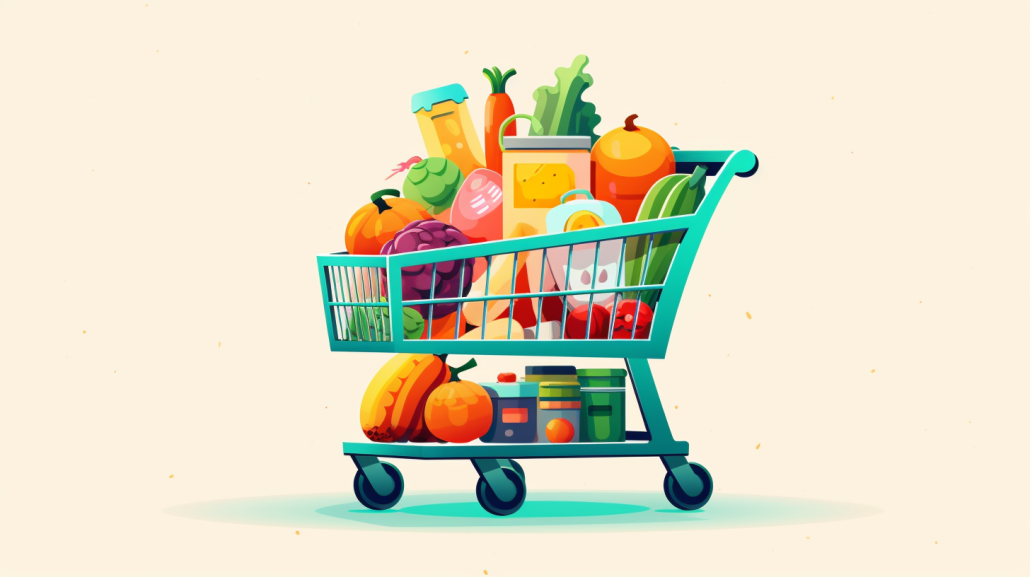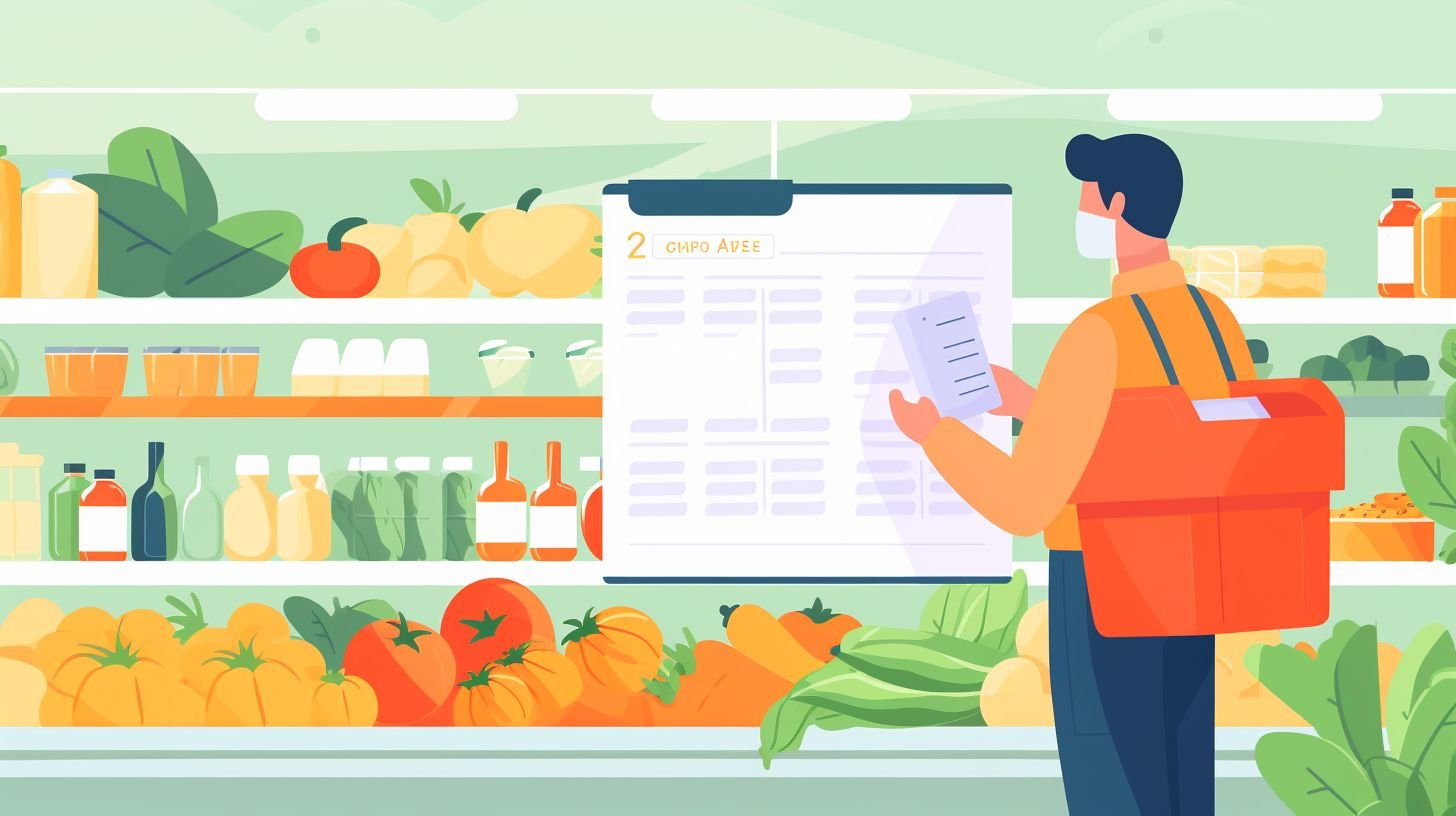How To Budget For Grocery Shopping

Key Takeaways
- Understanding your grocery budget is crucial for effective budgeting. Take into account your family size and previous spending to set a reasonable monthly limit.
- Implement strategies like reviewing your pantry, meal planning, creating a comprehensive grocery list, using cash, shopping at discount stores, understanding produce lists, opting for generic brands, buying in bulk strategically, utilizing coupons and rewards programs, timing your shopping right.
- Consider skipping pre-packaged foods and incorporating meatless meals to save money. Buying local and in-season produce can also help reduce costs while supporting local farmers.
Understanding Your Grocery Budget
Knowing how much money you have for groceries is key. This is your grocery budget. It tells you the cash you can spend on food each month. To start, look at what you spent last time. You may see that costs have gone up by 12%, as they did since October 2021. Now, think about the size of your family. One person could spend between $215 and $308 a month on food. A family of four might use around $968 a month. Review these numbers often to stay in line with your grocery budget. Don’t let it scare you! With smart steps, we can bring down these bills while still eating well!Effective Strategies to Budget for Groceries
To effectively budget for groceries, there are several strategies you can implement. This includes reviewing what you have in your pantry, planning your meals, creating a comprehensive grocery list, using cash for groceries, shopping at discount grocery stores, understanding the Clean Fifteen and Dirty Dozen produce lists, opting for generic brands, buying in bulk strategically, utilizing coupons and rewards programs, timing your shopping right, skipping pre-packaged foods when possible, incorporating meatless meals into your rotation, buying local and in season produce whenever possible to save money and support local farmers. Furthermore,Learning how to store food properly will also help prevent waste and maximize the life of your groceries. Shopping online for groceries may offer convenience as well as potential savings through exclusive deals or discounts.Reviewing What You Have in Your Pantry
 Look at what you have in your pantry first. You might find canned beans, pasta, or baking ingredients. These are things that can help you make meals without buying more food. Knowing what is already there means you don’t need to spend money on the same items again. Next, check if any of the foods are close to their use-by dates. If they are, plan to eat those foods soon so they do not go bad. This step helps stop food waste and saves money too! So before doing any grocery shopping, always raid your pantry first.
Look at what you have in your pantry first. You might find canned beans, pasta, or baking ingredients. These are things that can help you make meals without buying more food. Knowing what is already there means you don’t need to spend money on the same items again. Next, check if any of the foods are close to their use-by dates. If they are, plan to eat those foods soon so they do not go bad. This step helps stop food waste and saves money too! So before doing any grocery shopping, always raid your pantry first.Planning Your Meals
Meal planning helps save a lot of money. Here are some steps I follow:- Check what food I have at home first.
- Think about what meals I want to eat in the week ahead.
- Write down everything needed for these meals.
- Keep meals simple, with less costly ingredients.
- Use leftover food for lunch the next day.
- Include meatless meals to lower costs.
- Grow my own veggies when possible.
Creating a Comprehensive Grocery List
Making a good grocery list can help save money. Here is how to do it:- Look at your meal plan for the week.
- Write down all the food items you need.
- Don’t forget to add things like spices and oils if you are running low.
- Check your fridge, freezer and pantry.
- Cross off any items you already have.
- Add extras like cleaning supplies or paper goods to the list.
- Keep the list on your phone or a piece of paper.
- Take it with you when you go grocery shopping.
Using Cash for Groceries
Paying with cash for groceries is a smart way to budget and manage expenses. It helps you avoid overspending and stay within your grocery budget. When you use cash, you have a tangible limit on how much you can spend, which makes it easier to make mindful purchasing decisions. Additionally, paying with cash allows you to see exactly how much money you have left after each purchase, helping you keep track of your spending. By avoiding credit cards or debit cards, which may tempt you to spend more than planned or incur unnecessary fees, using cash ensures that the money spent on groceries is what fits within your budget. So next time you go grocery shopping, consider bringing along some cold hard cash!Shopping at Discount Grocery Stores
Shopping at discount grocery stores can be a great way to save money on your groceries. Stores like Aldi, Trader Joe’s, Lidl, and Market Basket offer lower prices compared to traditional supermarkets. These stores often have their own store-brand items that are cheaper than name brand products. By opting for these generic brands, you can still get quality products while saving some extra cash. Additionally, checking store flyers and coupons can help you identify discounted items and further maximize your savings. Another option is to buy groceries online, as this eliminates impulse purchases and may offer promotions or lower delivery fees.Understanding the Clean Fifteen and Dirty Dozen
The Clean Fifteen and Dirty Dozen are lists that help shoppers make informed choices when buying produce. The Clean Fifteen consists of fruits and vegetables that have the lowest pesticide residues, such as avocados, sweet corn, and pineapples. On the other hand, the Dirty Dozen includes produce with the highest pesticide residues, including strawberries, spinach, and apples. By prioritizing organic options for items on the Dirty Dozen list and opting for conventional options from the Clean Fifteen list, shoppers can save money while reducing their exposure to pesticides. These lists can be a helpful tool in making healthier choices within your grocery budget.Opting for Generic Brands
Switching from brand name groceries to generic brands is a smart move when it comes to saving money on your grocery budget. Store-brand items are generally cheaper than commercial goods and can help you cut down on expenses. By opting for generic brands, you can still get the same quality products without paying for the fancy packaging or advertising costs associated with brand names. It’s a simple way to stretch your dollar further and make your grocery shopping more affordable. Plus, there’s often little difference in taste or quality between generic and brand name products, making it an easy switch to make. So next time you’re shopping, consider choosing store-brand items and watch the savings add up!Buying in Bulk Strategically
 Buying in bulk can be a smart way to save money on groceries. Here are some tips for buying in bulk strategically:
Buying in bulk can be a smart way to save money on groceries. Here are some tips for buying in bulk strategically:- Look for deals: Keep an eye out for sales and discounts on bulk items. Take advantage of special promotions or coupons to stretch your grocery budget even further.
- Consider storage space: Before buying in bulk, make sure you have enough storage space at home. Bulk purchases often come in larger packaging, so it’s important to have a designated area to store them.
- Choose non-perishable items: When buying in bulk, focus on non-perishable items that have a long shelf life. This way, you can stock up without worrying about them spoiling before you can use them.
- Compare prices per unit: Always compare the price per unit or ounce to ensure that buying in bulk is actually cost-effective. Sometimes smaller packages may actually be cheaper than their bulk counterparts.
- Plan your meals: Before heading to the store, plan your meals for the week based on what items you have in bulk. This will help reduce food waste and ensure that you maximize the value of your purchases.
- Share with others: If you can’t finish all the items before they expire or if they’re too much for your household, consider splitting the cost and sharing with family or friends who might benefit from the bulk purchase as well.
Utilizing Coupons and Rewards Programs
Coupons and rewards programs are excellent ways to save money on your grocery shopping. Here are some effective strategies:- Clip coupons from newspapers, magazines, or online sources.
- Sign up for loyalty programs at your favorite grocery stores.
- Download apps that offer digital coupons and discounts.
- Take advantage of manufacturer’s coupons for specific products.
- Use cashback apps that give you money back after you make a purchase.
- Combine multiple coupons and discounts for even greater savings.
- Look for special promotions and deals offered by stores or brands.
Timing Your Shopping Right
To save money on groceries, it’s important to time your shopping right. One strategy is to shop earlier in the day when clearance shelves are often restocked. This gives you a chance to find discounted items before they’re gone. On the other hand, if you shop near closing time, you might get discounts on deli and bakery items that need to be sold before the store closes. Additionally, Wednesday is a good day to find deals because grocery stores tend to restock their shelves midweek. By being strategic about when you go grocery shopping, you can take advantage of these opportunities for savings.Skipping Pre-packaged Foods
When it comes to budgeting for groceries, one effective strategy is skipping pre-packaged foods. These convenience items often come with higher prices and additional costs for packaging and branding. Instead of buying pre-packaged meals or snacks, consider cooking from scratch using fresh ingredients. Not only will this approach save you money, but it can also be healthier since you have control over the ingredients used. Yes, skipping pre-packaged foods requires some planning and meal preparation, but the savings can be significant in the long run.Incorporating Meatless Meals
One effective way to save money on groceries is by incorporating meatless meals into your diet. Meat can be expensive, so opting for plant-based protein sources like beans, lentils, and tofu can help lower your grocery bill. These options are not only cost-effective but also nutritious and versatile. You can try making dishes like vegetarian chili, stir-fried vegetables with tofu, or bean-based salads. By reducing the amount of meat you consume and adding more plant-based meals to your rotation, you’ll not only save money but also explore new flavors and improve your overall health.Buying Local and in Season
Buying local and in season is a smart way to save money on groceries. When fruits and vegetables are in their peak harvest times, they tend to be priced lower. Plus, buying local supports your community farmers and reduces the carbon footprint from transportation. You can find local produce at farmers markets or through Community Supported Agriculture (CSA) programs. Not only will you enjoy fresher and more flavorful produce, but you’ll also be able to take advantage of the cost savings that come with buying in season. So next time you’re grocery shopping, keep an eye out for locally sourced fruits and veggies that are in season – your wallet and taste buds will thank you!Comparing Unit Prices
When shopping for groceries on a budget, it’s important to compare unit prices. This means looking at the cost per unit or ounce of different items to see which one offers the best value. Sometimes buying in bulk may seem like a good deal, but when you compare the price per unit, you might find that smaller packages are actually cheaper. By comparing unit prices, you can make more informed choices and save money on your grocery bill. So next time you’re at the store, take a moment to check those price tags and choose wisely!Avoiding Food Waste
To avoid food waste and save money, it’s important to review what you have in your pantry and fridge before going grocery shopping. By knowing exactly what ingredients you already have, you can create meal plans that utilize those items instead of buying more. Additionally, prioritize your food needs over wants to eliminate unnecessary purchases. Buying in bulk strategically can also help prevent waste by using ingredients already on hand. Lastly, consider freezing meals with ingredients that may otherwise go unused to extend their shelf life and reduce waste. Making these small changes can make a big difference in reducing food waste and saving money on groceries.Capitalizing on Product Markdowns
I love finding great deals on groceries by capitalizing on product markdowns. Grocery stores often mark down unsold items to make room for new inventory, so it’s important to keep an eye out for these discounts. One helpful tip is to shop midweek, particularly on Wednesdays, as this is when stores typically restock their shelves and mark down items from the previous week. Another strategy is to shop earlier in the day to access clearance shelves or shop near closing time for discounted prices on deli and bakery items. By taking advantage of these markdowns, I can save even more money on my grocery shopping.How to Make the Most of Your Grocery Shopping Experience
 Make the most of your grocery shopping experience by trying different grocery stores, learning how to store your food properly, using leftovers effectively, and even shopping online for groceries.
Make the most of your grocery shopping experience by trying different grocery stores, learning how to store your food properly, using leftovers effectively, and even shopping online for groceries.Trying Different Grocery Stores
When it comes to budgeting for groceries, trying different grocery stores can be a smart strategy. Here are some reasons why:- Different grocery stores have different prices and sales. By visiting multiple stores, you can compare prices and take advantage of the best deals.
- Each store has its own selection and variety of products. Exploring different stores can help you find new and affordable options for your meals.
- Some grocery stores specialize in discount or bulk items, which can save you money on certain products.
- Shopping at local farmers’ markets or specialty stores can often provide fresh produce at lower prices than larger chain supermarkets.
- Trying out different grocery stores allows you to discover the best fit for your needs and preferences, whether it’s based on price, quality, or convenience.
Learning How to Store Your Food
Learning how to store your food properly is crucial for maximizing its shelf life and minimizing waste. Here are some tips to help you store your food effectively:- Keep fruits and vegetables in the refrigerator crisper drawer to maintain freshness.
- Store potatoes, onions, and garlic in a cool, dark place to prevent sprouting or spoiling.
- Use airtight containers or resealable bags to store dry goods such as flour, rice, and cereal.
- Freeze meat, poultry, and fish in portioned sizes to prevent freezer burn and allow for easy meal planning.
- Label and date all leftovers before storing them in the refrigerator or freezer.
- Store spices in a cool, dry place away from direct sunlight to preserve their flavor.
- Use clear storage containers to easily see what’s inside and avoid forgetting about items.
- Place opened packages of cheese or deli meats in wax paper or aluminum foil before storing them back in the refrigerator.
- Utilize vacuum-sealed bags or containers for long-term storage of pantry staples like beans, pasta, and nuts.
- Avoid overcrowding your refrigerator or pantry shelves to ensure proper air circulation.
Using Leftovers Effectively
Leftovers can be a great way to save money on groceries. Here are some tips for using leftovers effectively:- Repurpose dinner leftovers into lunch or another dinner idea.
- Use leftover beans in another main dish like tacos.
- Get creative and find ways to make more cheap meals with what you have.
- Make it a goal to use everything you cook to save money on groceries.
- Pinterest can be a helpful resource for ideas on how to use leftovers effectively.
Shopping Online for Groceries
Shopping online for groceries is a convenient way to save time and money. When you shop online, you can easily compare prices from different stores and find the best deals available. Plus, using a rewards program or app can help you earn points or cash back on your grocery purchases, maximizing your savings. Another benefit of shopping online is that it allows you to stick to your budget more easily. You can see the total cost of your cart before checking out, helping you avoid overspending. Additionally, taking advantage of sales, bargains, and discounts often available when shopping online can lead to significant savings on your grocery bill.Common Mistakes When Budgeting for Groceries
 One common mistake when budgeting for groceries is not planning ahead. Many people go to the store without a list or a clear idea of what they need, which can lead to impulse buying and overspending.
One common mistake when budgeting for groceries is not planning ahead. Many people go to the store without a list or a clear idea of what they need, which can lead to impulse buying and overspending.Can I Use the Same Budgeting Techniques for Car Shopping as I Do for Grocery Shopping?
When it comes to budgeting for a car: new vs used, the same techniques may not apply as they do for grocery shopping. While you can set a budget for both, purchasing a car involves bigger financial decisions. Factors like depreciation, maintenance costs, and insurance rates must be considered, making budgeting for a car more complex than grocery shopping.





